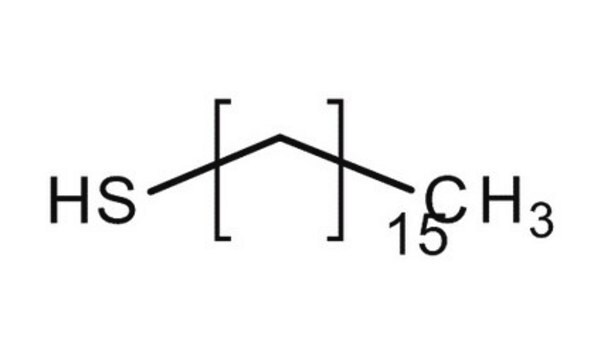674516
1-Hexadecanethiol
99%
Synonym(s):
Cetyl mercaptan, Hexadecyl mercaptan, Mercaptan C16
About This Item
Recommended Products
Assay
99%
refractive index
n20/D 1.462 (lit.)
bp
184-191 °C/7 mmHg (lit.)
mp
18-20 °C (lit.)
20-24 °C
density
0.84 g/mL at 25 °C (lit.)
storage temp.
2-8°C
SMILES string
CCCCCCCCCCCCCCCCS
InChI
1S/C16H34S/c1-2-3-4-5-6-7-8-9-10-11-12-13-14-15-16-17/h17H,2-16H2,1H3
InChI key
ORTRWBYBJVGVQC-UHFFFAOYSA-N
Looking for similar products? Visit Product Comparison Guide
General description
Application
Storage Class Code
10 - Combustible liquids
WGK
WGK 3
Flash Point(F)
215.6 °F - closed cup
Flash Point(C)
102 °C - closed cup
Personal Protective Equipment
Certificates of Analysis (COA)
Search for Certificates of Analysis (COA) by entering the products Lot/Batch Number. Lot and Batch Numbers can be found on a product’s label following the words ‘Lot’ or ‘Batch’.
Already Own This Product?
Find documentation for the products that you have recently purchased in the Document Library.
Customers Also Viewed
Articles
Magnetic nanoparticles have attracted tremendous attention due to their novel properties and their potential applications in magnetic recording, magnetic energy storage and biomedicine.
Recent research highlights tunable properties of inorganic nanoparticles, driving interest in optoelectronics.
Self-assembled monolayers (SAMs) have diverse applications; article compares benefits of alkylthiolates on gold SAM systems.
Our team of scientists has experience in all areas of research including Life Science, Material Science, Chemical Synthesis, Chromatography, Analytical and many others.
Contact Technical Service










